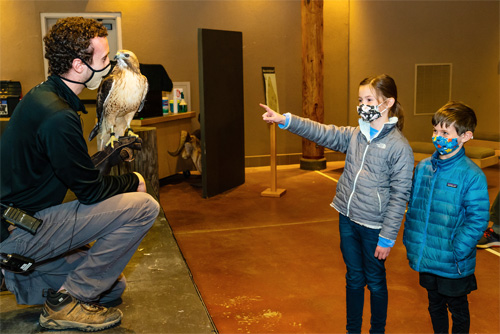News Releases | October 26, 2021
Share This$15 Million in American Rescue Plan Grants Awarded to Museums, Libraries, and Native Communities
Funds to Support Pandemic Response Work Across the Nation

Washington, DC—The Institute of Museum and Library Services today announced $15,255,733 in American Rescue Plan (ARP) Act grants to institutions across 49 states, the District of Columbia, and Puerto Rico to support the role of museums and libraries in recovering from the coronavirus pandemic. A total of 390 projects were selected from 572 applications requesting $22,840,028. Institutions receiving awards are matching them with $20,030,419 in non-federal funds.
“IMLS is proud to announce our awards for the American Rescue Plan, which provide relief and succor in so many different ways through a vast number of institutions, patrons, and their communities,” said IMLS Director Crosby Kemper. “Keeping the connection of our cultural institutions to their communities digitally and through staff outreach, the preservation and presentation of collections, exhibits and direct social services, including health information and direct care, workforce preservation and development, and many, many educational activities related to the pandemic and frequently directly related to school district curriculum, makes this a unique and proud moment for IMLS in the history of service to our nation.”
The IMLS website lists all funded library, museum, and Native projects, including:
-
Exploration Place in Wichita, Kansas, will create and implement an online and in-person educational program that will promote recovery from the COVID-19 pandemic by raising awareness of key mental health issues and teaching strategies that program participants can use to improve their own mental health. The project also will support national efforts to address the unequal socioeconomic impact of mental illness and reduce the stigma that prevents many people from seeking treatment.
-
The Wexner Center for the Arts at the Ohio State University in Columbus will expand its free arts resilience programs to help individuals, families, and neighborhoods emerge from the pandemic with a sense of wellbeing and human connection. The arts resilience programs reduce social isolation, improve cognition, and offer techniques for coping.
-
The Barnes Foundation in Philadelphia will facilitate a museum-community partnership program supporting a vulnerable population of emergent English language learners ages 3–5 and their families from South Philadelphia’s Latinx immigrant community. This program is especially critical due to disruptions in early childhood programs during the COVID-19 pandemic.
-
The Nez Perce Tribe in Lapwai, Idaho, is working to highlight the meaningful return of a significant collection of treasured artifacts to the Tribe and the recent renaming ceremony honoring those items. The Wetxuuwíitin’ Collection of sacred Nez Perce clothing and related items is one of the few remaining and most complete collections of Native American clothing artifacts dating from pre-1840. This project will help the Nez Perce recover from the isolation caused by the COVID-19 pandemic using the connection to Tribal heritage as a means of community empowerment, recovery, and resiliency.
-
The Cynthiana-Harrison County Public Library in Kentucky will partner with the local Chamber of Commerce to create a business center with access to computers, internet, and printing and faxing services to help the small business community and job seekers. The project will enable the library to develop spaces for small businesses to conduct their work as well as provide more computers and hotspots for patrons to check out for use at home.
-
The Wahluke School District project in Mattawa, Washington, will help bridge equity gaps in literacy experienced by rural, low-income, Hispanic students that were further exacerbated by the COVID-19 pandemic. With this project, physical and digital books will be purchased for libraries at three elementary schools and a junior high school. Makerspaces within the libraries will invite students to use knowledge gained using technology during the pandemic to demonstrate literacy and build learning agency and self-efficacy.
-
The Wake County Public Libraries in Raleigh, North Carolina, will address the remote learning gap created during the pandemic for students in kindergarten through second grade. To address these disproportionate effects on the youngest learners, the libraries will create weekly in-person educational, interpretive, experiential programs to nurture a love of reading, reinforce literacy skills, and foster intellectual growth.
For more information about IMLS ARP Act funds distributed directly to State Library Administrative Agencies that may still be available, please visit each SLAA’s page. For a listing of other open IMLS grant opportunities, please visit the IMLS website. For more updates, subscribe to email notifications or visit www.imls.gov.
About the Institute of Museum and Library Services
The Institute of Museum and Library Services is the primary source of federal support for the nation's libraries and museums. We advance, support, and empower America’s museums, libraries, and related organizations through grantmaking, research, and policy development. Our vision is a nation where museums and libraries work together to transform the lives of individuals and communities. To learn more, visit www.imls.gov and follow us on Facebook and Twitter.

